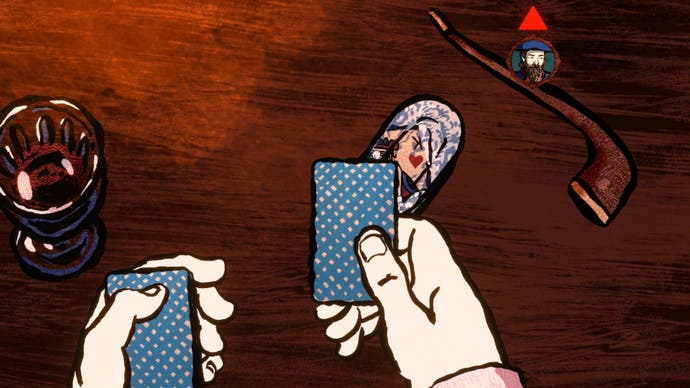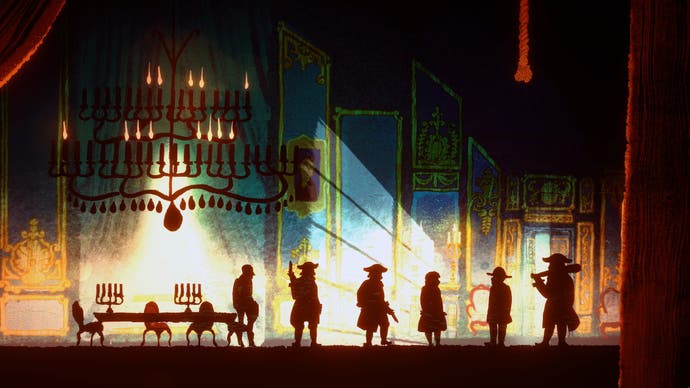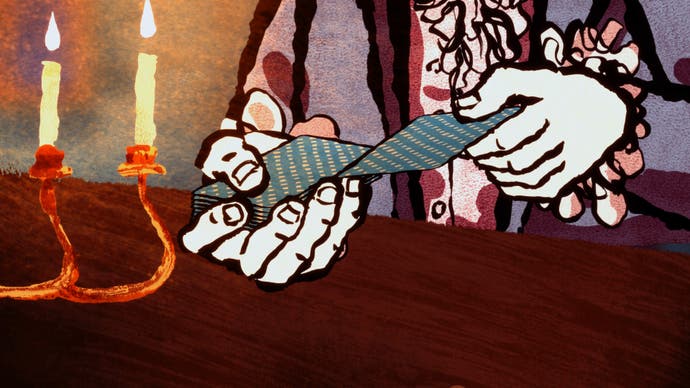Card Shark review - scoundrels and intrigue, delivered with a flourish
Aces!
Listen. There's a card trick you like. You look it up in a book, make sense of the weird diagrams, and get it all semi-straight in your head. You find a pack of cards, get them comfortable in your hand, make sense of the weird diagrams again - they seem to have changed now you have actual cards to hold - and then? Then you practice. Alone, on the sofa, by a window, perched in front of a mirror like you're supposed to do it, you practice and practice. Finally you have the trick down. Everything's so elegant. The joins are invisible. The flex and flow of the cards is deeply pleasing to your soul. Even the patter is coming along. It all works beautifully.
And then you try the trick in front of other people and it completely falls apart.
This is a good part of the appeal of Card Shark, I think. You learn, you practice, and then you perform - but suddenly the cards feel weird and seem to want to stick together. Suddenly there's sweat where there shouldn't be sweat. Suddenly you have two hands, as it were, and that feels like at least one too many. Disaster.
Card Shark is brilliant. It's a game about card games, but it isn't a card game itself - not really. It's a game about tricks, but you're in a world of con artists rather than magicians. The setting is eighteenth century France with its wigs and corruption and candlelit intrigue. Chasing the threads of a conspiracy, you and a handful of friendly thieves must work your way through the stacked deck of high society, finding the aces as you go.
It's an adventure and a puzzle. In the adventure you choose where to go as France slowly opens up to you. You learn as much as you can about the mystery that surrounds you, and you try to work out who amongst your compatriots can be trusted.
But the main action always plays out at a card table. As you progress through the story you learn new techniques for making the cards flow in your favour - learn and learn and learn; there is so much learning in this game right until the end, and it might be the boldest thing about the design. Then you encourage your marks to give all their money to you, ensuring you raise your bets incrementally so as not to make them skittish, and trying to keep your sleights and trickery out of view.
Sleights and trickery! One of the problems facing Card Shark is that cards themselves are inordinately charismatic things. The shuffle, the flourish, the pedantic squaring of the pack - these are beautiful aspects of cards that cannot easily be conveyed in a digital medium, and that's before you get to the corrugated purr of a really good card spring or the lightning snap of an ace hitting the table. If I'm playing a game about card trickery, part of me wants to have the feel of the cards in my hand. What to do?
Card Shark has two responses to this. The first is the visual design, which uses monoprinting and - I think - watercolours, along with some lovely Noggin-the-Nog style animation to deliver an overwhelming sense of a world that is itself made of paper. Skies have delicate whorls and furrows that might put you in mind of the filigreed etching of old money. Characters bend at fixed joints like delicate two-dimensional puppets in a children's theatre. Candlelight is a bloom of reds and purples soaking into the surroundings, while columns and windows and vaulted ceilings are all dealt with by brisk pen-stroke pedantry, a sketch on the fly: the disciplined eye and the wild mind.

The second response is that while Card Shark can't give you 52 cards to move around in your hands, it has a deep rigour that almost balances this out. It fakes very little. Its tricks are built up incrementally from a range of pieces - sneaking looks while pouring wine, signalling cards to an accomplice, palming, loading decks, false shuffles, and more complex card control. All of these bits of business are dealt with through manipulations of the thumbstick and a few timed button presses, but as one technique slots together with another - a glimpse of someone's hand married with the signal of what you've seen as an early example - it starts to feel like a complex technical, mechanical, psychological process, which is exactly what it would be if you actually had the cards themselves. Dexterity comes into it, memory and speed of movement and the ability to keep an eye on people who are in turn keeping an eye on you. Card Shark doesn't just teach you stuff that will get you killed in Vegas, it manages to get at that fascinating paradox underlying the whole enterprise: it takes hard work and practice and skill to get good at cheating people.
I should point out here: I am a sucker for this stuff. Show me a false shuffle or a force and I'm anybody's. But I think Card Shark has the ability to win new people over too. Like a good card trick, it combines simple elements in increasingly ingenious ways as the games grow in risk and complexity. One minute you're learning how to in-jog a card so your friend always gets the ace and everyone else ends up with beans and horsehair, the next you're reading cards as you deal them by watching their reflections in a mirrored tobacco case that is itself shifting around the surface of a captain's table deep inside a sailing ship.

There is joy here - the joy of mastering unlikely skills and stealing from the aristocracy. But Card Shark's real flair is for dread. Increasingly it is a kind of dread that sets in with each new game, each new country house and higher, deadlier, rung on the social ladder. If it sounds improbable that someone could track the journey of an ace through a deck that is allegedly being shuffled, well, it is - and getting it where you want it to go is going to be trickier still. You have to learn all this: the theory, the physicality of the controls, and get it down just so. And then you have to perform it not just with your rival's frustration meter rising, but with the incessant plucking of the nerve-shredding score, all glockenspiel ribcages, slow horns and darting strings.
If you can handle all that, there is so much to enjoy here. Card Shark is a game that offers controls for handling a deck of cards that another game might use for casting spells - and is there really any difference? Magic and thievery come together in cards and coins after all, and always have done.
It reminds me of a story about Ricky Jay, the great and much-missed close-up magician and historian of magic. After a particularly dazzling piece of card control performed for a New Yorker writer, he was asked if there was anyone left in the world who would still play cards with him.
"Sure," he replied. "Silly people."











